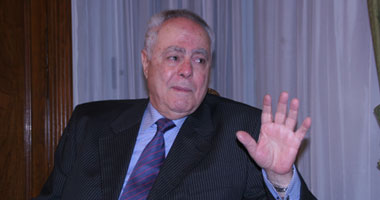 CAIRO: Disagreements over the participation of people affiliated with the former regime marred the second session of the National Dialogue Conference on Sunday.
CAIRO: Disagreements over the participation of people affiliated with the former regime marred the second session of the National Dialogue Conference on Sunday.
Some participants objected to the presence of supporters of the former regime and members of the disbanded National Democratic Party, leading to loud arguments.
Former Prime Minister Abdel Aziz Hegazy, head of the dialogue committee, said mistakes can be corrected but that no one will be removed from the hall by force. He said “chaos” would ruin the purpose of the dialogue.
“This dialogue is built on three main pillars that were demanded by the people during the revolution: freedom, democracy and social justice,” Prime Minister Essam Sharaf told the conference earlier.
“Building the future on these three pillars will help realize a dream, a personal dream, a popular dream of 85 million Egyptians: the dream of an able, leading Egypt, that’s both enlightened and enlightening.”
Participants at the National Dialogue Conference Saturday demanded that Cabinet and the ruling Supreme Council of the Armed Forces (SCAF) agree to draft a new constitution through a constituent assembly ahead of legislative and presidential elections.
They proposed that the conference recommend basic constitutional principles that act as a basis for the new constitution and cannot be modified by any authority.
"The conference isn't an alternative to the constituent assembly that will be assigned to draft a new constitution, but will suggest a framework that the assembly can accept or refuse," said Yehia Al-Gamal, deputy prime minister and head of the conference.
Secretary General of the Arab League and presidential hopeful Amr Moussa, called Saturday to postpone parliamentary elections slated for September, until after the presidential poll or a new constitution is in place.
Moussa said September was too early for legislative elections, in which Islamists are expected to make a strong showing at the expense of poorly organized secular groups.
"I am not for a postponement of the democratic process, and I believe it should start before the end of the year, but I think September is too early to hold parliamentary elections," he said.
"It's better to start either with the election of a people's founding committee to put in place a new constitution or to hold presidential elections," he said at the conference.
The conference, comprising representatives from various political streams, professional syndicates and civil society organizations, was noticeably boycotted by the Muslim Brotherhood (MB) and representatives of other religious streams.
Participants decried the fact that the SCAF is imposing laws unilaterally and that the scenario for the transitional period must be reviewed because it will produce the same political powers that existed before the revolution.
"A revolution cancels the constitution not suspends it; a new constitution must be drafted by a constituent assembly of experts and not by the upcoming parliament," said constitutional law expert Ibrahim Darwish.
"Legislative elections now will produce the same powers that dominated before the revolution [which is why] the transitional period must be extended," he added.
Vice-president of the Supreme Constitutional Court Tahany Al-Gebaly demanded the SCAF hold a referendum on whether to issue a constitution or hold elections first.
"The constitution organizes institutions and not the opposite, it must be drafted ahead of electing a parliament," she said.
Ali Al-Selamy, assistant chairman of Al Wafd Party, said that it will be difficult to hold elections while poor security conditions and sectarian tension prevailed.
"Instead of engaging in social discussions we can use the upcoming three months to put in place a new constitution without draining resources," he said
"The majority of political powers want a constitution before the elections except one political stream that wants the elections as soon as possible," he added.
Participants criticized the MB for refusing to attend and said that they are looking for their "private not the public interests ".
"If the MB believes that they will be the majority in the upcoming parliament and will form a constitution according to their desires, this will be a disaster and will increase social tension and undermine the civil state," said Refa'at A-Saeed, chairman of the leftist Al-Tagammu Party.
"All democratic and national powers must unite to face this rising tide," he added.
Al-Gamal said that he contacted all national powers but some told him that there is no need to rush and that they will be in the next parliament and will form the constitution through the 100-persson elected constituent assembly according to the amendments to the constitution.
Al-Gamal did not specify the boycotting groups but participants said it is the MB and said that some groups are working to serve their own agendas.
However, a number of participants criticized those who are calling for a constitution ahead of the elections and accused them of not respecting the people's will which was expressed in the referendum results.
They accused them of being "elitist and not representative of the people" by trying to impose their will on the rest, and criticized organizers for excluding a number of political powers.
"We didn't exclude anyone; a list was made of all participants who were invited and the Cabinet was responsible for inviting them," said General Mamdouh Shahin, SCAF's head assistant for legal affairs.
Amr Hamzawy, political science professor at Cairo University, said that in the absence of elected institutions, reconciliation meetings are the alternative.
"Differences and accusations of not being representative are natural in this phase but such a conference can agree on basic principles for the upcoming constitution," he said.
Workers and peasants criticized calls for canceling their 50 percent quota in parliament and said that they will "fight any constitution that insists on discriminating against them".
The conference is set to have its next session Thursday. –Additional reporting by agencies.a



